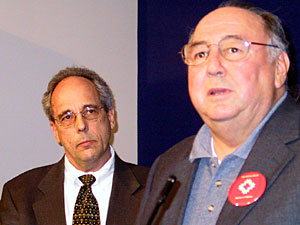Photos
Your Voice
| |||||||||||||||||||||||||||||||||||||||||||||
State-run casino idea dividing Native Americans
March 25, 2003
 |
| Doyle Turner, chairman of the White Earth Band of Ojibwe, right and Rep. Bill Haas, R-Champlin, are supporters of a metro-area casino run by the state. (MPR Photo/Michael Khoo) |
St. Paul, Minn. — The White Earth and Red Lake tribes comprise nearly 70 percent of Minnesota's Native American population, but tribal representatives say their remote northern location has kept them out of the lucrative gambling market that has buoyed other tribes.
Doyle Turner, chairman of the White Earth tribe, says the proposed metro-casino would funnel much needed development money back to the reservations.
"We wait and wait and wait for things to come to us. And we feel like it's time for us to come out and make our own way. We're looking for tools, we're asking for tools to be able to do this, to help the tribal members provide for themselves, to bring equity into the gaming situation in Minnesota," Turner says.
But most of Minnesota's 11 tribes take a dim view of the plan. The nine tribes of the Minnesota Indian Gaming Association say a full-scale casino will draw customers away from their existing operations and cut into their own revenues.
Jim McCarthy, the executive director of MIGA, says he understands the needs of the White Earth and Red Lake bands. But he notes that the casino would actually be state owned and operated. And he says there's no guarantee the tribes will see the generous revenues they're expecting.
"This is going to help a very small number of people. And I will be surprised in the end that any poor people would end up being helped by this. I believe that the state of Minnesota will benefit, the metro area will benefit at the expense of rural Minnesota and rural economies and Indian tribal governments," according to McCarthy.
The bill's chief House author, however, says there's plenty of gambling revenue to go around. Rep. Bill Haas, R-Champlin, characterizes the casino plan as a job-creation and economic development package.
"That's what intrigued me about this whole proposal is the state's a winner, the taxpayers are a winner and the Native American community that is bringing this proposal together is winning because they're helping themselves become sufficient," says Haas.
Although a similar plan failed to gain traction last year, Haas says the influx of new legislators may have changed the equation. Earlier this week, the same committee narrowly forwarded a separate gambling bill that allows slot machines at the Canterbury Park racetrack.
Haas also notes that the state's projected $4.2 billion deficit may change some lawmakers minds. Early estimates indicate the state would collect as much as $150 million a year from the casino.
Sen. Sandy Pappas, DFL-St. Paul, says is carrying the proposal in the Senate. "Clearly the economic situation of the state has changed where we really have to be more creative in how we're going to meet the needs of the citizens of our state."
Gambling opponents, however, say they're skeptical that the plan will live up to its advertised benefits. Sen. Jim Vickerman, DFL-Tracy, chair of the Senate State Government Operations Committee, says he hasn't decided whether to give gambling bills a hearing this year. And he says gambling produces as many -- or more -- social problems as it solves.
"I personally don't think it's free money, because I see the evil in gambling more than I see the good. And that my own personal opinion. Because what happens is that those who can't afford to gamble usually are the ones that desperately try it, try to hit the lucky numbers and it doesn't work," Vickerman says.
Tribal members, however, hope to persuade opponents otherwise. Several hundred members of the White Earth and Red Lake tribes will rally at the Capitol on Wednesday in support of the metro casino.
|
News Headlines
|
Related Subjects
|

